July 5, 2025 – Meeting with INEB Secretary-General, Moving to Dubuk Retreat Center
Hello. Today, after all the INEB (International Network of Engaged Buddhists) delegation members visiting Jungto Society returned to their home countries, Sunim held an evaluation meeting with INEB Secretary-General Moo to discuss future collaboration plans.

After completing his morning practice and meditation, Sunim headed to the Jungto Social and Cultural Center. At 8 AM, he held a meeting with INEB Secretary-General Moo in the reception room.
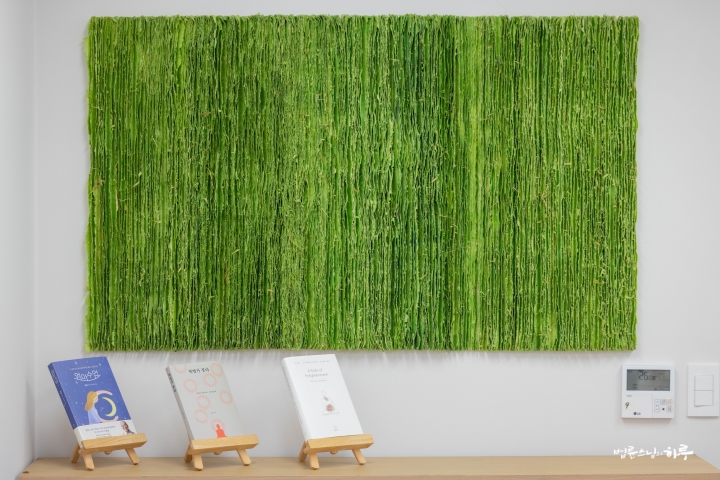
Before starting the meeting, Sunim presented Moo with the English edition of his new book “The Buddha: A True Revolutionary.”
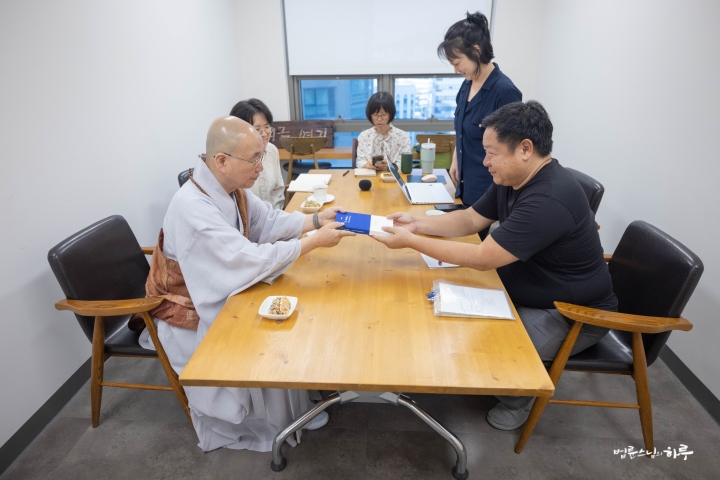
First, Moo shared the agenda items he wanted to discuss with Sunim.
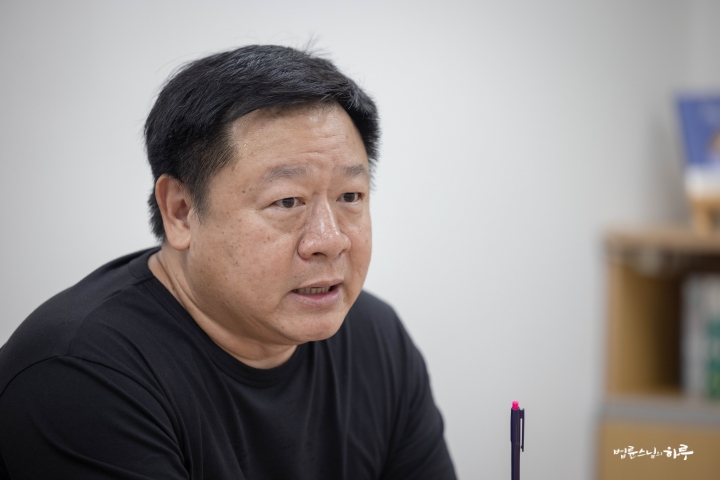
“In November this year, INEB and the Bhutan GNH Center are co-hosting a conference in Bhutan. We would like you to give the keynote presentation.”
“My schedule for the second half of this year is already fully booked. Thank you for the invitation, but I don’t have the time.”
“I understand. I know how busy you are. How is the project that JTS is currently conducting in Bhutan?”
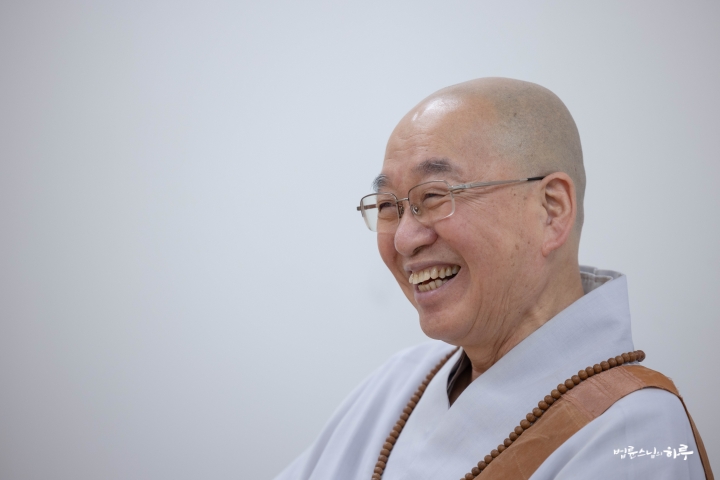
“After completing a one-year pilot project, we signed an MOU for the main project last June. We’re building houses for those without homes, repairing houses with poor interiors, installing water supply systems in villages lacking water, paving walking paths in each village, installing irrigation channels, building fences to prevent animal intrusion, and partially paving roads for vehicles. We’re working on these basic living improvements. We’re also treating elderly people who can’t see or hear, and repairing school facilities. The villagers provide the labor, and JTS provides the necessary materials. The project period is three years. We also conducted workshops with Bhutanese government officials to implement this project.
The project direction is set and the budget is secured, but the key factor is how well the Bhutanese government officials can fulfill their roles. When people asked whether it would fail or succeed, I answered, ‘There is no failure.’ Because if the Bhutanese officials use all the budget, it will be a success, and if they can’t use all the budget, the project won’t progress but that much money will remain.”
“I saw the video of you training Bhutanese government officials. I was moved by how well it showed the method of encouraging village residents’ participation.”
They then discussed building a JTS center in Bangkok and the prospects for inter-Korean relations under the Lee Jae-myung government, before discussing the INEB-Jungto Society exchange program, which is now in its 10th year. When Moo asked a question, Sunim responded:
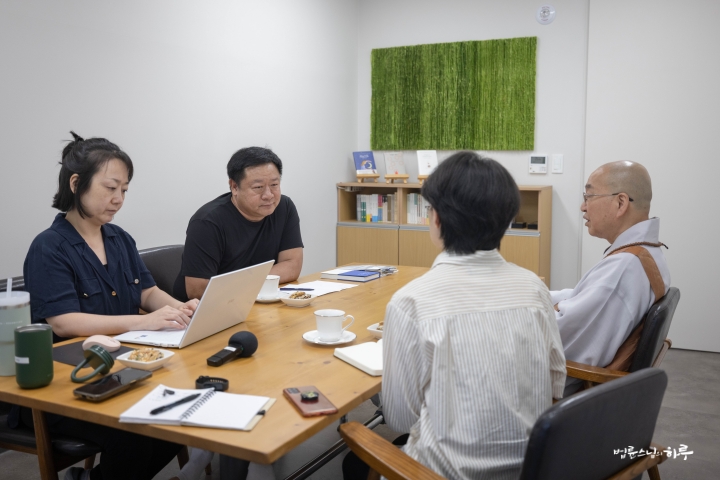
“It’s been 10 years since we started the INEB-Jungto Society exchange program. We’ve tried having monks and female activists participate together and then separately. I’m curious about your evaluation.”
“If it’s helpful, I’m willing to continue. However, it’s difficult for me to judge how helpful it has actually been. The results seem to vary greatly depending on who is selected. For those who have concerns about engaging in social action, it’s definitely very helpful, but for those who participate without particular concerns, they sometimes feel fatigued instead. On the other hand, for those who come with a clear purpose to learn, it’s definitely a meaningful time.
When monks and female activists participated together, due to cultural reasons in Southeast Asia, female activists could hardly speak at all. When we gathered only female activists separately, the relationships became much more equal and they spoke freely. So I think it’s better to separate monks and female activists. This time, for the 10th anniversary, we gathered only those who have continued social activities among past participants and gave them plenty of time to talk and discuss with each other. Everyone responded that it was much better.”
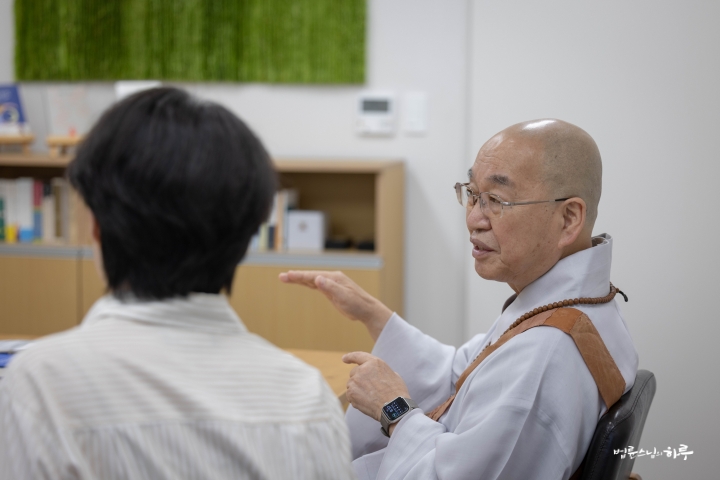
“Yes, that’s right. For four years, we’ll invite new people and run observation programs, and once every five years, we’ll re-invite those who have visited before and are actively engaged in social activities. I think this approach would work well.”
Next, they discussed various topics for four hours, including how to promote exchanges between Korean Buddhism and Southeast Asian Buddhism, how to enhance cooperation among INEB Study Tour participants, and how to provide humanitarian aid to Myanmar, before concluding the meeting.
“Let’s wrap up the meeting here and continue our discussion after heading down to Dubuk.”
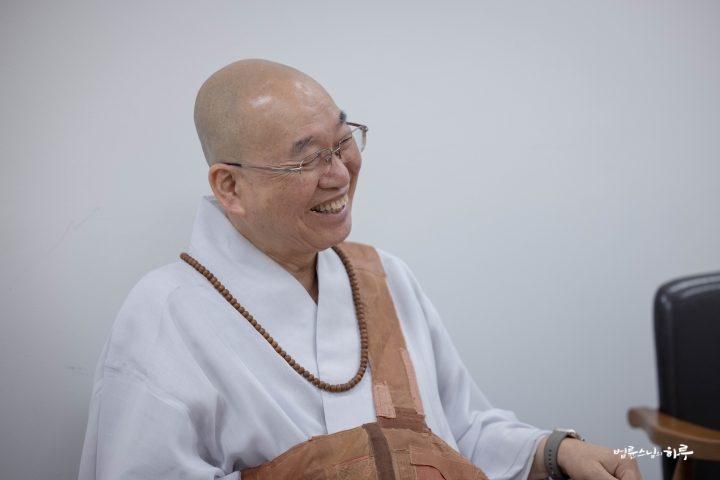
They moved together to the basement dining hall for lunch, then departed from Seoul Jungto Center at 1 PM, heading to Dubuk Jungto Retreat Center.

After a four-hour drive, they arrived at Dubuk Jungto Retreat Center at 5 PM. After having dinner with Mr. Moo, they continued their conversation into the night.
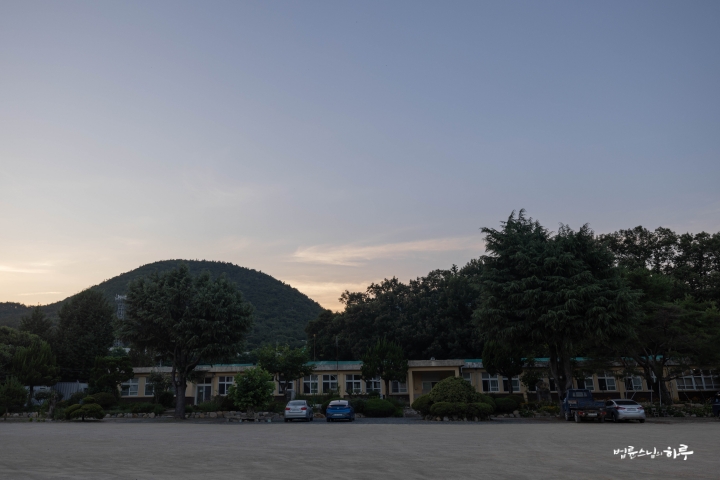
Tomorrow morning, Sunim will visit the Cheonjeon-ri and Bangudae petroglyphs with Mr. Moo, followed by a meeting. In the afternoon, he plans to visit his elder brother, who is reportedly in critical condition.
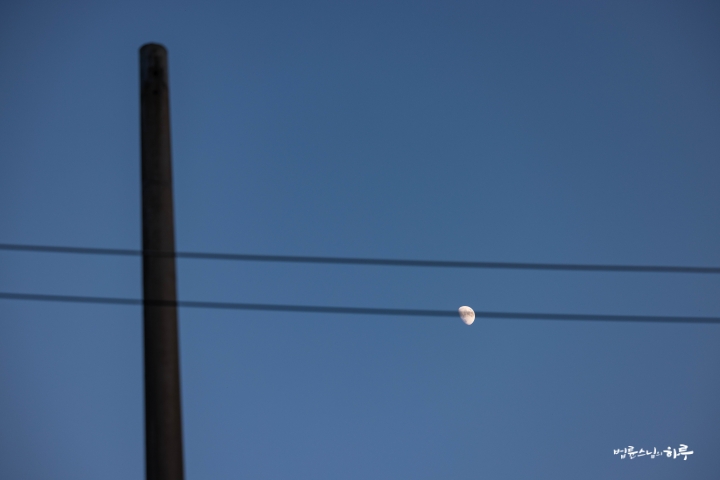
Since there was no Dharma talk today, we’ll conclude by sharing a conversation between Sunim and a questioner from the Friday Dharma Q&A on the 27th of last month.

How Can I Get Along Better with My Daughter When We Keep Clashing?
“That question is too vague. It’s like asking, ‘How can I make a lot of money?’ or ‘How can I stop fighting with my husband?’ Such vague questions are pointless. What’s the specific problem?”
“When my daughter says, ‘Mom, get out of my room,’ I respond, ‘Then you get out of my house and live independently,’ but she doesn’t leave. The next day, I find her lovable again and end up giving her everything she wants and wants to eat. Because my heart is weak like this, the same situation keeps repeating. How can I get along well with my daughter?”
“So you’re destined to live fighting and then giving in, over and over. Just live that way. There’s no other way. When your daughter says ‘Get out of my room,’ just say ‘Okay’ and leave. Then you won’t fight. But why do you tell her to leave the house?”
“Because it’s hard for me to support her financially.”
“Then just don’t support her financially.”
“If I don’t, my husband insists that I should, and he secretly helps her. My husband is always backing her up.”
“Then divorce your husband.”
“But I love my husband very much.”
“So this isn’t your daughter’s problem or your husband’s problem—it’s your problem. That’s why blaming your daughter and husband won’t lead to any solution. You just have to live with all this drama. If you don’t want to live like that, when your daughter says ‘Get out of my room,’ just say ‘Okay’ and leave. And don’t cook her favorite foods. You can sort this out yourself; there’s no need to make your daughter the problem. If you make your daughter the problem, you’ll receive the karmic result of living with all this drama. If you don’t want that result, I’m not saying to ignore the relationship, but just do what your daughter asks and don’t do things she hasn’t asked for. Right now, you don’t listen when she tells you to leave her room, but you cook for her even when she doesn’t ask—that’s why problems arise. There’s no solution for that. You’ll just have to live with the drama.”
“It’s embarrassing to say, but I’m really suffering emotionally.”
“Well then, live in suffering. If there’s poisoned food here and someone says ‘I want to eat this,’ and I tell them ‘It’s poisoned,’ should they eat it or not?”
“They shouldn’t eat it.”
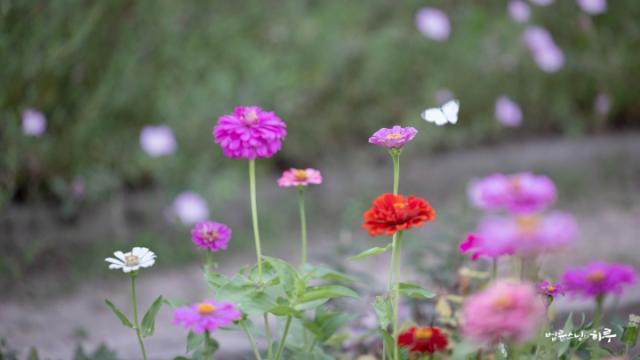
“But if they say ‘I’m dying to eat it,’ I’d say ‘Then eat it and die.’ Since you keep insisting like this, you have no choice but to eat it and die.”
“I feel guilty because I left her alone at home to go out and make money since she was young.”
“There’s no need to ask if you can eat just a little poisoned food because you’re so hungry. Being hungry is your situation, but eating that food will kill you. If you don’t want to fight with your daughter, just do what she asks and don’t do what she doesn’t ask for—live comfortably. When your husband says something, just say ‘Yes’ and then don’t do it. This problem is like a silkworm creating a cocoon with silk from its own body and getting trapped inside—you’re creating this suffering yourself. If you live that way, you’ll continue to suffer. If you really don’t want to suffer, stop making excuses. Why do you keep telling her to leave, knowing she won’t?”
“She’s old enough to be independent.”
“She’s old enough but isn’t becoming independent—what can you do? If you think that way, you’ll have to perform a shamanistic ritual. If someone says ‘If you perform a ritual, your daughter will leave,’ even if it costs a lot of money, believe it and try it once.”
“I don’t believe in shamanistic rituals.”
“Then live with your daughter and try to adjust your relationship in a way that minimizes interference. That will solve half the problem.”
“Yes, I understand. Thank you.”






Thank you sunim. All the sufferings that I made, I can choose to quit it right away.